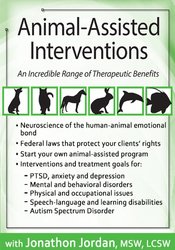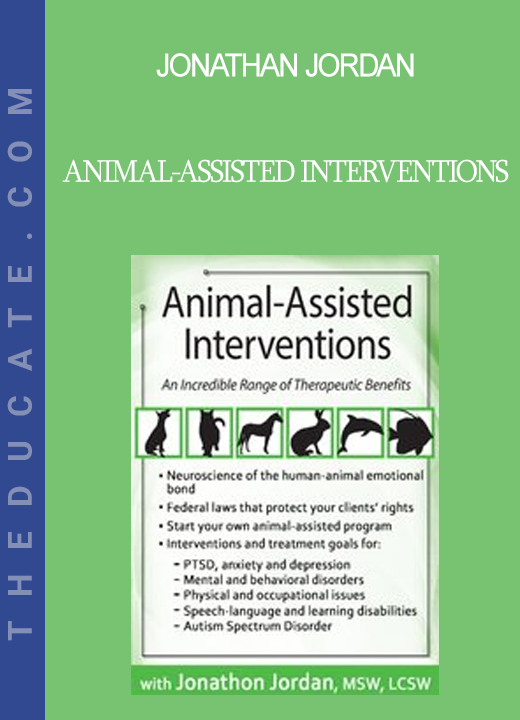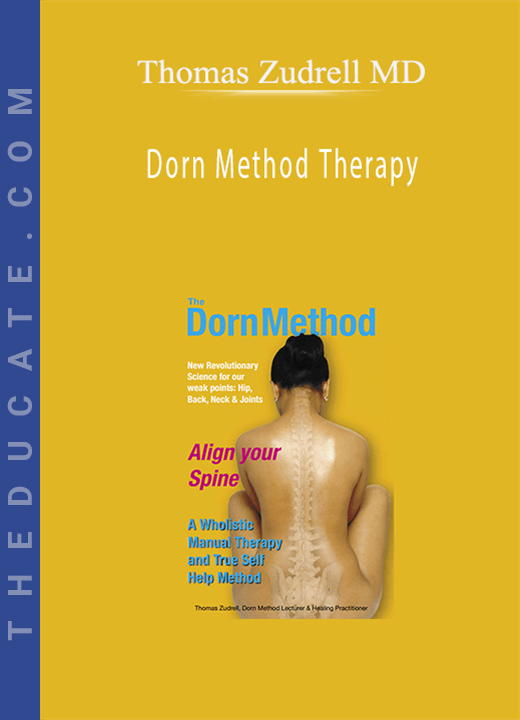Description

-
Jonathan Jordan – Animal-Assisted Interventions: An Incredible Range of Therapeutic Benefits
- Faculty:
- Jonathan Jordan
- Duration:
- 6 Hours 1 Minutes
- Format:
- Audio and Video
- Copyright:
- Sep 14, 2017
Description
- Neuroscience of the human-animal emotional bond
- Federal laws that protect your clients’ rights
- Start your own animal-assisted program
- Interventions and treatment goals for:
- PTSD, anxiety and depression
- Mental and behavioral disorders
- Physical and occupational issues
- Speech-language and learning disabilities
- Autistic Spectrum Disorder
This seminar is designed to help you discover how incorporating animals into your professional activities can greatly improve client outcomes in a surprisingly broad range of areas, including:
- Reduce stress and anxiety levels and lower blood pressure
- Lessen feelings of loneliness and depression
- Help people suffering from agoraphobia
- Improve sensory recognition in people recovering from a stroke
- Support people dealing with trauma
- Help children with learning disabilities
You will receive specific examples of animal-assisted therapeutic goals in a variety of functional areas. This seminar also includes the latest research outcomes, solid foundational knowledge about the human-animal emotional bond and up-to-date information about relevant laws. You will also discover very practical information and resources to help you implement your own animal-assisted interventions.
Handouts
| Manual ZNM030075 (10.26 MB) | 83 Pages | Available after Purchase |
| Instructions for ASHA Credit – SELF STUDY ONLY – 09/14/17 (0.03 MB) | Available after Purchase | |
| ASHA Participant Form – SELF STUDY ONLY – 09/14/17 (1.54 MB) | Available after Purchase |
Outline
Brief Overview
- Human-animal emotional bond
- Therapy animal vs. service animal vs. emotional support animal
- Animal-assisted therapy vs. animal-assisted activities
- Handler vs. therapist
Mindfulness of Animals and How it Helps the Human Brain
- The neuroscience of the human-animal bond
- Why zebras don’t get ulcers
- Animal-assisted interventions without an animal
The Legal Landscape
- Four federal laws that impact animal-assisted interventions
- Client rights and when not to involve an animal
- Informed consent
Interventions and Treatment Goals
- Physical and occupational issues
- Fine and gross motor skills
- Standing balance
- Sensory processing
- Mental, emotional, and behavioral disorders
- PTSD, anxiety and depression
- Loneliness and self-esteem
- Autism spectrum disorder
- Speech-Language and learning disabilities
- Dyslexia and other learning difficulties
- Vocabulary improvement
- Increase verbal interactions
Components of Animal-Assisted Intervention
- How to approach clients
- Interaction techniques for client and animal
- Closure, documentation
Evidence-Based Research and Outcomes
- Disorders that respond well to animal-assisted interventions
- Autism spectrum disorders
- ADHD and related childhood educational issues
- Speech and language disorders
- Stroke and geriatric issues
- Depression and anxiety
- PTSD
- Benefits of owning a companion animal
Start Your Own Animal-Assisted Program
- Animal qualifications and characteristics
- Preparing and caring for the animal
- When the animal shows signs of stress and agitation
- Organizations and resources for starting your animal-assisted program
Faculty
Jonathan Jordan, MSW, LCSW, ACSW Related seminars and products: 3
Global Change Management, Inc.
Jonathan Jordan, MSW, LCSW, ACSW, is a renowned licensed psychotherapist and clinical supervisor who has a love for both animals and neuroscience. For decades, he has combined these two loves by incorporating animal-assisted interventions into his brain-based professional practice. Over the years, Jonathan has trained several of his own dogs to be successful therapy animals. Not only does he integrate his therapy dogs into his own practice, Jonathan also works closely with a variety of other medical and mental health professionals to engage his therapy animals in their respective treatment modalities. He has co-developed a unique and evidence-based approach to animal-assisted intervention, the KADRA Model, which engages animals to enhance mindfulness in humans. Jonathan is a long-time member of the prestigious Society for Neuroscience and is a charter member of the Society for Social Neuroscience. Thus, he has extensive knowledge of both human and animal neuroscience research.
Jonathan is an international speaker and author on the topic of animal-assisted interventions motivating others to harness the power of the human-animal bond. He has trained thousands of professionals in his unique synthesis of East-West brain-based practices and AAT. Jonathan is currently writing a book about animal-assisted interventions that explains the incredible range of therapeutic benefits that come from the human-animal emotional bond. He serves as a faculty fellow of Florida State University and was engaged by the United States Senate to deliver brain-based professional development workshops to the entire Senate Staff on Capitol Hill in Washington, DC.
Speaker Disclosure:
Financial: Jonathan Jordan is the President and part owner of Global Change Management, Inc. He is a financial donor to Pet Partners; and Canine Companions for Independence. Mr. Jordan receives a speaking honorarium from PESI, Inc.
Non-financial: Jonathan Jordan is a member of the National Association of Social Workers; Society for Neuroscience; and Society for Social Neuroscience.






Reviews
There are no reviews yet.